As a car owner, you’re probably aware that coolant is an essential fluid that helps regulate the temperature of your engine. It prevents your engine from overheating, which can lead to costly repairs and even engine failure. However, there’s a lot of confusion surrounding coolant and whether or not it can be mixed. In this article, we’ll debunk some of the myths and provide you with accurate information about coolant mixing.
Myth #1: All Coolants Are the Same
One of the most common misconceptions about coolant is that all types are the same, and they can be mixed without any problem. This is simply not true. Coolants are formulated differently, and they’re designed to work with specific types of engines. Mixing different types of coolant can cause chemical reactions that can damage your engine.
For example, mixing green coolant with orange coolant can lead to a chemical reaction that creates a gel-like substance that can clog your radiator and engine passages. This can result in poor engine performance, overheating, and even engine failure. So, it’s essential to check your car’s owner’s manual to see what type of coolant is recommended for your engine.
Myth #2: Adding Water to Coolant Is Okay
Another common misconception is that adding water to coolant is okay. While it’s true that water can help cool your engine, it’s not recommended to use it as a replacement for coolant. Coolant contains special additives that protect your engine from corrosion and wear. Water does not have these additives, and it can actually cause corrosion and rust in your engine.
In addition, water can freeze in cold weather, which can cause your engine to crack or suffer damage. So, it’s always best to use a proper coolant mixture instead of adding water.
Myth #3: All Coolants Can Be Mixed with Water
While we’ve established that adding water to coolant isn’t recommended, some people still believe that all coolants can be mixed with water. This is not true. Coolants come in different concentrations, such as 50/50 or 70/30, and they’re designed to be used as is. Adding water can dilute the coolant mixture and reduce its effectiveness.
In addition, some coolants are formulated to work specifically without water. Adding water to these types of coolants can cause a chemical reaction that can damage your engine. So, it’s crucial to read the instructions on the coolant container and follow them carefully.
Myth #4: It’s Okay to Mix Old and New Coolant
Some people believe that it’s okay to mix old and new coolant, but this is not true. Over time, coolant can break down and lose its effectiveness. Mixing old and new coolant can create an uneven mixture that can cause engine damage.
In addition, different types of coolant can have different lifespans. For example, some coolants can last up to 5 years, while others only last 2 years. Mixing old and new coolant can shorten the lifespan of your new coolant and reduce its effectiveness.
Conclusion
Coolant is an essential fluid that helps regulate the temperature of your engine. While it’s tempting to think that all coolants are the same and can be mixed, this is not true. Mixing different types of coolant or adding water to coolant can cause chemical reactions that can damage your engine. So, it’s crucial to check your car’s owner’s manual to see what type of coolant is recommended for your engine and to follow the instructions on the coolant container carefully. By doing so, you can protect your engine and prevent costly repairs.
Regular maintenance helps extend the life of your vehicle, which can you save you quite a bit of money over the years. Are you ready to save money on your auto insurance as well? A DriveSafe Online defensive driving course completion certificate could be worth hundreds of dollars in discount savings on your insurance premium. Select I’M READY to lock in your low price now. You can begin the course whenever your schedule allows.

Patrick M. is Editorial Director for the always expanding DriveSafe Online library of courses. With over two decades of experience developing award-winning training, he now focuses on innovating online driver safety training. Pulling from his background in journalism, he steers the wheel behind the creation of top-tier content that promotes a better journey—whether on the digital highway of learning or the real roads we travel every day.
